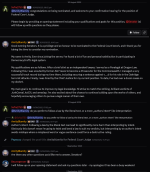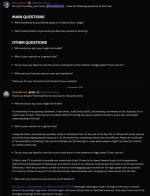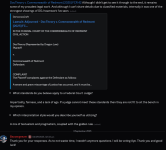ToadKing
Illegal Lawyer
Representative
Public Defender
Supporter
Aventura Resident
5th Anniversary
Change Maker
Popular in the Polls
Statesman
ToadKing__
Representative
- Joined
- Apr 4, 2025
- Messages
- 368
- Thread Author
- #1
Motion
IN THE SUPREME COURT OF THE COMMONWEALTH OF REDMONT
MOTION FOR EMERGENCY INJUNCTION
Judge AmityBlamity was confirmed by the Senate to the Federal Court on 4 September 2025, in direct violation of the Conflict of Interest Standards Act. The nominee provided zero financial disclosure during their confirmation hearing, despite Section 5(2) of the Act explicitly requiring:
Section 5(3) provides that:(2) These disclosures must be made available to the confirming body in the nominee’s opening statement.
(3) Failure to provide complete and accurate disclosure shall disqualify the nominee from consideration.
Judge AmityBlamity is currently presiding over active cases and making judicial decisions despite the fundamental defect in their appointment. These actions, if allowed to continue, will cause irreversible harm to the administration of justice, the integrity of the courts, and the parties appearing before this illegally-confirmed judge, in addition to undermining the rule of law and Congressional intent behind the Conflict of Interest Standards Act.
Thus, Plaintiff ask that for the duration of this case:
- All cases currently assigned to Judge AmityBlamity be immediately frozen and stayed
- Judge AmityBlamity be prohibited from presiding over any cases, issuing any orders, or exercising any judicial authority
- All cases currently assigned to Judge AmityBlamity be reassigned to other Federal Court judges
Case Filing
IN THE SUPREME COURT OF THE COMMONWEALTH OF REDMONT
CIVIL ACTION
ToadKing
Plaintiff
v.
Commonwealth of Redmont
Defendant
COMPLAINT
The Plaintiff complains against the Defendant as follows:
WRITTEN STATEMENT FROM THE PLAINTIFF
On 23 August 2025, Congress enacted the Conflict of Interest Standards Act, establishing mandatory disclosure requirements for all judicial nominees. This Act explicitly requires nominees to provide detailed financial disclosures in their opening statement during confirmation hearings. Despite this clear legal requirement, the Commonwealth proceeded to confirm AmityBlamity as Federal Court Judge on 4 September 2025, without the nominee having provided any financial disclosure whatsoever during their confirmation hearing.
I bring this action not out of any personal grievance against Judge AmityBlamity, but to uphold the rule of law and ensure that our government officials - particularly those in the judiciary - are appointed in accordance with the law. If we allow this violation to stand, we establish a precedent that compliance with appointment requirements is optional, and that the Senate may confirm nominees regardless of whether they meet statutory requirements.
I. PARTIES
1. ToadKing2. Commonwealth of Redmont
II. FACTS
1. On or around 23 August 2025, the Conflict of Interest Standards Act was signed into law and enacted immediately upon signature. (P-001)2. The Conflict of Interest Standards Act applies to "all positions within the Judicial Branch, including but not limited to: Chief Justice, Justice, Judge, and Magistrate."
3. Section 5(1) of the Act mandates that "All nominees for positions covered by this Act must provide a detailed financial disclosure statement, including:
- (a) All business ownership interests
- (b) All executive officer positions held in the past 3 months
- (c) All significant financial investments and assets"
5. Section 5(3) provides the consequence for non-compliance: "Failure to provide complete and accurate disclosure shall disqualify the nominee from consideration."
6. On or around 30 August 2025, President JuniperFig nominated AmityBlamity for the position of Federal Court Judge, occurring seven days after the Conflict of Interest Standards Act took effect. (P-002)
7. On or around 30 August 2025, AmityBlamity provided an opening statement during their confirmation hearing. (P-003)
8. AmityBlamity's opening statement contained only information about their qualifications, legal experience, and goals for the position.
9. AmityBlamity's opening statement contained zero information regarding:
- Business ownership interests
- Executive officer positions held in the past 3 months
- Significant financial investments and assets
11. No Senator questioned the nominee about potential conflicts of interest or requested financial disclosures during the hearing.
12. On or around 4 September 2025, the Senate voted to confirm AmityBlamity as a Federal Court Judge.
13. The confirmation occurred despite the nominee's complete failure to comply with Section 5 of the Conflict of Interest Standards Act.
14. Since confirmation, and as of 25 October 2025, Judge AmityBlamity has presided over and/or made rulings in eight Federal Court cases:
- ToadKing v. Commonwealth of Redmont [2025] FCR 109
- Mezimoří Union Bancorporation v. Aesyr_ [2025] FCR 108
- Dartanboy v. Commonwealth of Redmont [2025] FCR 101
- ToadKing v. Culls [2025] DCR 82 (originally in FCR)
- Pepecuu v MattTheSavvy [2025] FCR 100
- peuko v. Commonwealth of Redmont [2025] FCR 105
- Nimq_ v. Commonwealth of Redmont [2025] FCR 92
- Vanguard & Co v. Naezaratheus [2025] FCR 32
- DeltaruneTMRW v. Culls [2025] FCR 111
- Vendeka Inc. and Pepecuu v. Department of Commerce [2025] FCR 107
- KingBOB99878 v. truffleboy123 [2025] FCR 104
- Gribble19 v. The Exchange Inc [2025] FCR 102
- 12700k v jb4bass [2025] FCR 93
III. CLAIMS FOR RELIEF
1. Violation of Mandatory Statutory Requirements
The appointment of Judge AmityBlamity to the Federal Court is fundamentally defective because it violated mandatory requirements established by the Conflict of Interest Standards Act.As this Court held in Plura72 v. Realimza [2025] SCR 17:
This case presents exactly such a defect. The Conflict of Interest Standards Act established clear, mandatory requirements for judicial appointments:In a 2-0 vote, the Supreme Court dismisses this case sua sponte for lack of standing under rule 2.1(3). The only standing the Plaintiff alleges before the Supreme Court is through the removal of office of Representative Imza. This is a remedy available in very few circumstances—only through criminal prosecution or after proving a defect in the manner in which the government official obtained their office. See Plura72 v. JuniperFig [2025] SCR 16; zLost v. Commonwealth of Redmont [2025] SCR 14; ToadKing v. Commonwealth of Redmont [2025] SCR 13; ToadKing v. Commonwealth of Redmont [2025] SCR 12; bigpappa140 v. Commonwealth of Redmont [2025] SCR 11.
We have made it abundantly clear at this point that we, the Supreme Court of Redmont, may only remove an individual from office using our constitutional powers under limited circumstances. These include if the State is prosecuting a crime, or if there was an alleged defect, mistake, or otherwise illegitimate background to the defendant's obtaining the office that the plaintiff is asking us to remove the defendant from.
- Section 5(1) requires detailed financial disclosure statements from all judicial nominees
- Section 5(2) mandates that these disclosures "must be made available to the confirming body in the nominee's opening statement"
- Section 5(3) provides the consequence: "Failure to provide complete and accurate disclosure shall disqualify the nominee from consideration"
Judge AmityBlamity provided zero financial disclosure during their confirmation hearing (P-003). This is not a matter of incomplete disclosure or technical deficiency - it is complete non-compliance with a mandatory statutory requirement. The nominee's opening statement contained only career qualifications and goals, with no mention whatsoever of business interests, executive positions, or financial investments (P-003).
The Senate confirmed this nomination despite this clear violation. Whether this occurred through oversight, ignorance of the new law, or deliberate disregard is immaterial. The law was in effect, the requirement was mandatory, and the confirmation proceeded in violation of that law.
This creates a fundamental defect in how Judge AmityBlamity obtained their office. The confirmation was not merely procedurally irregular - it was legally invalid. Section 5(3) states that failure to disclose "shall disqualify the nominee from consideration." Once disqualified, a nominee cannot be validly confirmed, regardless of the Senate's vote.
2. Ongoing Violation of Law
The Commonwealth's continued allowance of Judge AmityBlamity to serve constitutes an ongoing violation of the Conflict of Interest Standards Act.Section 5(3) provides that failure to disclose "shall disqualify the nominee from consideration." The plain meaning of "disqualify" is to render ineligible or unfit. A disqualified nominee cannot become a validly appointed judge, regardless of Senate confirmation.
By allowing Judge AmityBlamity to continue serving despite never having provided the mandatory disclosure, the Commonwealth is effectively nullifying Section 5(3) of the Conflict of Interest Standards Act. The Commonwealth cannot simply ignore mandatory statutory requirements because they prove inconvenient or because the violation was not caught until after confirmation. The rule of law requires that government officials, particularly judicial officers, be appointed in accordance with the law.
3. Undermining Judicial Integrity
The Constitution, Section 21 states:The entire purpose of the Conflict of Interest Standards Act is to "preserve the integrity of public service" and ensure "all government appointees can serve the public interest and provide for a clear separation between public and private interests."21. Judicial Officers
They are responsible for presiding over and delivering unbiased verdicts in all lawsuits.
Congress determined that mandatory financial disclosure was essential to prevent conflicts of interest and maintain public confidence in judicial appointments. The Act clearly states:
By confirming a judge without the mandatory disclosure, the Commonwealth has:(3) The appointment of individuals with clear conflicts of interest to positions of public trust constitutes an affront to the Commonwealth and undermines public confidence in government.
- Undermined the integrity safeguards that Congress specifically enacted
- Created uncertainty about whether Judge AmityBlamity has conflicts of interest
- Made it impossible for the public to assess whether the judge should have been disqualified under Section 4
- Established a precedent that compliance with appointment requirements is optional
- Presided over and/or made rulings in eight cases that could potentially be subject to appeal on grounds of judicial illegitimacy
- Currently presides over five active cases where parties are being denied their right to appear before a legally confirmed judge
The parties in The parties in DeltaruneTMRW v. Culls [2025] FCR 111, Vendeka Inc. and Pepecuu v. Department of Commerce [2025] FCR 107, KingBOB99878 v. truffleboy123 [2025] FCR 104, Gribble19 v. The Exchange Inc [2025] FCR 102, and 12700k v jb4bass [2025] FCR 93 are currently litigating before a judge who should have been disqualified from consideration.
This is precisely the type of systemic harm to judicial integrity that the Conflict of Interest Standards Act was designed to prevent.
IV. PRAYER FOR RELIEF
The Plaintiff respectfully requests that this Honourable Court:1. Declare that the confirmation of AmityBlamity as Federal Court Judge was legally defective due to the violation of mandatory requirements in the Conflict of Interest Standards Act;
2. Remove AmityBlamity from the office of Federal Court Judge pursuant to this Court's constitutional authority under Section 20(1)(a);
3. Order that the five active cases currently assigned to Judge AmityBlamity be immediately reassigned to other Federal Court judges;
4. Declare that the three verdicts issued by Judge AmityBlamity (Dartanboy v. Commonwealth of Redmont [2025] FCR 101, Nimq_ v. Commonwealth of Redmont [2025] FCR 92, and Vanguard & Co v. Naezaratheus [2025] FCR 32) were issued by an illegally-confirmed judge, and that parties in those cases have grounds to seek appropriate remedies;
5. Order that the Commonwealth implement procedures to ensure future judicial nominations comply with the Conflict of Interest Standards Act.
EVIDENCE:
Act of Congress Post in thread 'Conflict of Interest Standards Act'
Presidential Assent
This bill has been granted assent and is hereby signed into law.

By making this submission, I agree I understand the penalties of lying in court and the fact that I am subject to perjury should I knowingly make a false statement in court.
DATED: This 15th day of October 2025
Attachments
Last edited:



